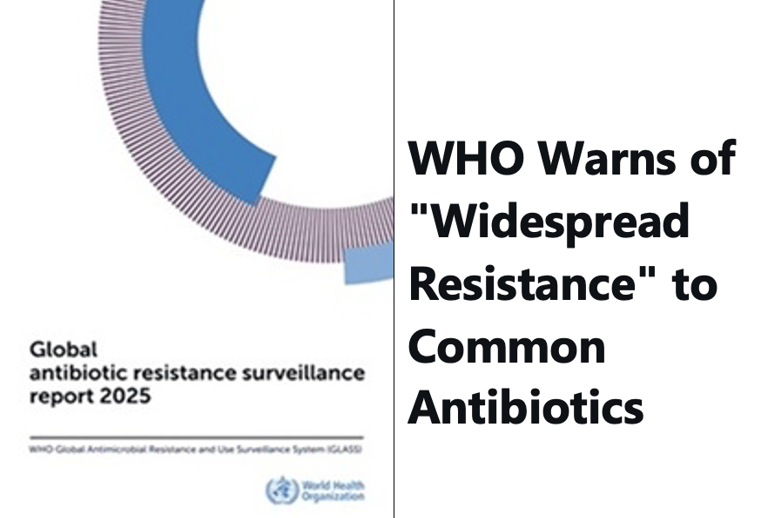Stay updated on what is trending in health. Discover tips and resources for a healthier, balanced life.
WHO warns of "Widespread Resistance" to Common Antibiotics
The WHO warns of widespread resistance to common antibiotics, threatening modern medicine. Learn the findings from the WHO report and urgent actions needed.
NEWS
Dr. S. Ali
10/17/20252 min read


GENEVA, Oct 13, 2025 – The World Health Organization (WHO) has issued a stark warning, announcing that resistance to common, first-line antibiotics is now widespread worldwide, pushing humanity closer to a post-antibiotic era where routine infections could once again become fatal.
The alert, based on data from the Global Antimicrobial Resistance and Use Surveillance System (GLASS), highlights that essential drugs used for decades to treat common illnesses are losing their effectiveness at an alarming rate.
Key Findings from the WHO Report
The report outlines a dangerous convergence of trends that signal a global public health crisis:
Widespread Resistance in Common Bacteria: High levels of resistance have been confirmed in common bacterial pathogens, including Escherichia coli (E. coli) and Klebsiella pneumoniae, which are leading causes of urinary tract infections, bloodstream infections, and pneumonia.
First-Line Drugs Are Failing: Critically important antibiotics like cephalosporins and fluoroquinolones are now ineffective in a majority of infections in many countries. This forces doctors to rely on last-resort treatments, which are more expensive, less accessible, and often have more severe side effects.
Ineffective Prevention in Healthcare: The failure of these common antibiotics undermines their use to prevent infections during routine medical procedures, including cesarean sections, cancer chemotherapy, and organ transplants.
The "Silent Pandemic" is No Longer Silent
"For years, antimicrobial resistance (AMR) has been called a 'silent pandemic'," said a senior WHO official in the statement. "The data now shows it is silent no longer. We are witnessing the erosion of the foundation of modern medicine. The world must act now to preserve these essential medicines for future generations."
The report stresses that AMR is not a future threat—it is a current reality, complicating the treatment of infections and increasing mortality rates globally.
What This Means for Public Health
The practical implications of this warning are severe:
Longer Hospital Stays: Infections become harder to treat, leading to prolonged illness and increased recovery time.
Higher Medical Costs: The need for more expensive second- and third-line drugs places a massive burden on healthcare systems and families.
Increased Mortality: Common infections, such as pneumonia and sepsis, could become untreatable, leading to a significant rise in deaths.
Risky Medical Procedures: Standard surgeries and immunosuppressive therapies could become too dangerous to perform due to the high risk of untreatable infection.
A Call for Urgent Global Action
The WHO is calling for an immediate, multi-pronged response from governments, healthcare systems, and the agricultural sector:
Strengthened Surveillance: Enhance global systems to track AMR trends and outbreaks.
Prudent Antibiotic Use: Implement stricter regulations and guidelines to curb the overuse and misuse of antibiotics in human health and animal agriculture.
Investment in Innovation: Boost funding for the research and development of new antibiotics, diagnostics, and vaccines.
Public Awareness Campaigns: Educate the public and healthcare professionals on the correct use of antibiotics and the dangers of resistance.
How You Can Help
While a global response is essential, individual actions also play a critical role:
Only use antibiotics when prescribed by a certified health professional.
Never demand antibiotics for viral illnesses like colds or the flu.
Always complete the full course of treatment, even if you feel better.
Never share or use leftover antibiotics.
Practice good hand hygiene to prevent infections in the first place.
The WHO concludes that the window to safeguard one of modern medicine's most vital tools is closing rapidly. Coordinated and decisive action is needed now to prevent a future where a simple scratch or routine surgery could once again be life-threatening.
Pulse Your Health
Empowering you to achieve your health goals.
Contact
© 2026. All rights reserved.
Disclaimer: The content on this website is for informational purposes only and is not medical advice. Always seek the advice of your physician or other suitably qualified healthcare professional for diagnosis, treatment and your health related needs.
